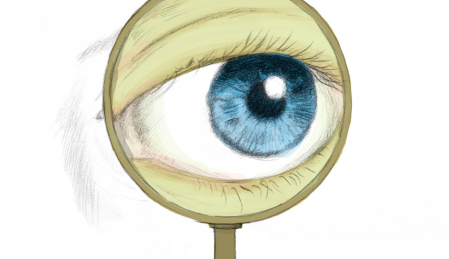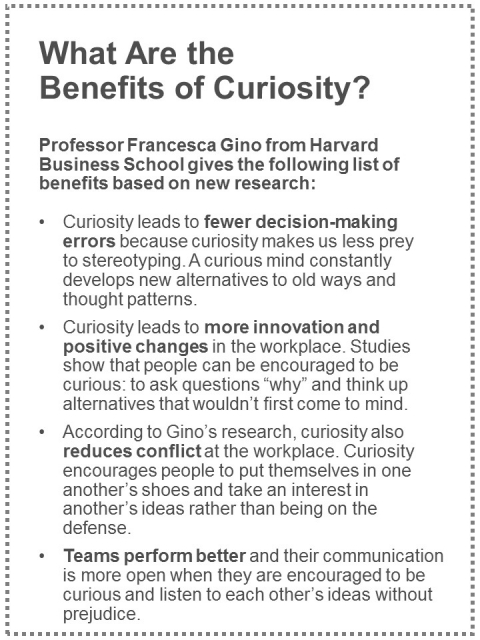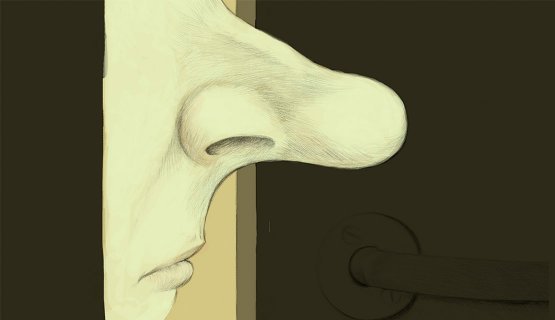In television series Stranger Things, actress Winona Ryder along with her friends and the police investigates supernatural events that are happening in the American town of Hawkins. Netflix hit a new record with the opening episode of the third season: 40 million viewers. When Joyce Byers played by Ryder thinks she has discovered what the strange goings-on are all about, she turns to her children s natural science teacher to see if he thinks her theory is possible. Although her theory is definitely odd, the teacher responds: It is possible.
This is how he justifies it: “We cured polio in 53. Landed on the moon in 69. As I tell my students: Once you open up that curiosity door, anything is possible”.
The same lesson is now being repeated in the business world and academic research: any invention or innovation is possible as long as we let curiosity run riot. So open that door!
Professor Francesca Gino from Harvard Business School has researched curiosity, claiming that more or less all innovation is connected to curiosity in one way or another.
In an extensive article published in Harvard Business Review titled The Business Case for Curiosity (9-10/2018), she writes that curiosity has a much more significant role for an organization’s success than imagined.
Her latest research sheds new light on the role of curiosity on business from three viewpoints. Firstly, curiosity helps leaders and employees adapt to uncertain, changing conditions and operating environments. Curious people come up with creative solutions to problems, and curious leaders are inspiring and trustworthy because they are open to the wildest ideas.
Secondly, research shows that even minor changes to the organization and working culture can encourage curiosity, whether a question of the creative industries or routine jobs.
There is a constant need to learn new things and curiously seek new alternatives in a rapidly changing world."
The third, new research angle is that although leaders think they appreciate curiosity, they often act the opposite in practice. Gino’s comprehensive, cross-sectoral studies show that only an average of one in four employees feels they are curious at work, and as many as 70 per cent feel that even posing additional questions is met with restrictions.
The professor sees it as a major problem, as being allowed to ask questions and question is vital. It’s also important to curiously head towards new alternatives – ones that wouldn’t even come to mind without endless curiosity. “What if…?” are the key words.
Gino justifies the importance of curiosity from a business point of view.
In other words, it’s not about the fact that workplaces that encourage curiosity are exciting and come up with a constant influx of ideas, but about curiosity making good business sense.
When the World Economic Forum listed the emerging skills for 2022 in its The Future of Jobs Report 2018, most future skills were connected to curiosity in some way: innovation, developing new ideas, active learning, critical thinking, problem-solving… Each of these areas requires a curious mind. The foundation is an idea of continuous learning, and knowledge and skills acquired at school in the past not being enough anymore. There is a constant need to learn new things and curiously seek new alternatives in a rapidly changing world.
“Curiosity is a superpower”, highlights Riitta Lumme-Tuomala, Head of Growth at Aalto University Executive Education. “If you lack interest and curiosity in what’s going on, you simply won’t succeed.”
Curiosity is the cure or at least part of the solution to many problems related to the changing world of work. Studies have found that in order to succeed in a constantly changing operating environment, those with a desire to learn and learning agility do best. Curiosity has a direct effect: a curious person has a desire to learn, find new viewpoints and skills, and take a look around each corner. Many tasks require applying personal skills in a new situation. Curious people look at uncertainty more through a lens of enthusiasm than worry. They are quick to grasp the new context, sniff around, find out, and ask questions.
Rapid change and uncertainty are a good match for a curious person, who sees it as an opportunity: when nothing is certain, everything is possible.
Curiosity is a superpower also because it’s what gives humans an edge over robots. It explains why curiosity is now talked about more than before.
What the world of work needs right now is new learning – people with skills a machine cannot replace."
“Machines will take care of whatever can be achieved by applying what’s old. What the world of work needs right now is new learning – people with skills a machine cannot replace. Curiosity is one of those skills. Robots aren’t curious”, says Riitta Lumme-Tuomala.
When machines take care of processes, people are left with empathy, a human touch – and reaching out towards the future where robots cannot go alone. Curiosity generates that much talked about work engagement, a drive to go forward or deeper, whether in research, transformation, or an innovation process. “What are all the possible solutions for this particular problem? Just think of all the possibilities!”
Job vacancies: Sweco is looking for a leading circular economy specialist!
According to the ad, the desired candidate “has a suitable mix of curiosity, commitment, and responsibility”.
Sweco specializes in the built environment and industry, planning and designing cities of the future: buildings, infrastructure, industry, and energy and water solutions. It has chosen curiosity as one of its values. Sweco Group has a total of 16,000 employees and carries out projects in 70 different countries around the world. It has a turnover of EUR 1.8 billion.
Why is curiosity one of Sweco’s values?
“When the entire business focuses on the future – something that doesn’t exist yet – curiosity is definitely an important quality”, says Markku Varis, President of Sweco Finland. At Sweco, curiosity is a value that pervades all activities. “We believe that a combination of expertise and curiosity is the key to something greater.”
A company can of course have lofty-sounding values on paper, but Sweco has considered what curiosity means on every level of activities. Varis gives some examples of how curiosity is evident in practice at Sweco.

Let’s take customer insight for instance.
Sweco may be involved in designing a shopping center or residential area.
“We need to understand the customer intent, goals, business, and entire value chain. We also need to grasp the end user and countless other instances involved: the investor, commissioner, constructor, authorities, maintenance company, and so on. Searching for future solutions in this context simply isn’t possible without curiosity. There are no off-the-peg solutions, as each situation is new.”
His second example of curiosity is linked to the employer brand.
Sweco mainly employs engineers and architects, but also chemists, microbiologists, coders and healthcare experts. The company has noticed the same as many other expert organizations: employees want to be engaged in work that has meaning and shows their imprint. They are eager to develop their competence, and value responsibility instead of orders. “Curiosity is a natural part of self-development. Our responsibility as a company is to ensure the preconditions for career advancement. Curiosity motivates constant learning.”
And the third example about valuing curiosity:
“We want to foster openness as far as our activities and culture are concerned. We want people to bring their ideas and thoughts to the table without someone immediately putting an end to them”, Varis illustrates. The company needs ideas both to develop its own activities and solve customer issues. “The culture needs to allow people to open their mouths. It shouldn’t be punished but praised.”
Markku Varis is an engineer. Let’s ask him a cliché: Is an engineer inherently the opposite of curiosity – an “engineer brain” who thinks logically inside the box without glancing around?
Familiar with the cliché, Varis is quick to respond: “We have a saying at Sweco that even an engineer is a human being!”
On a more serious note, he adds that it’s actually a combination of engineering skills and curiosity that the company offers to its customers. “In addition to head knowledge and expertise, our commitment to projects is characterized by our knowledge combined with our heart and soul. Curiosity helps apply technical expertise.”
No one can afford to say that a particular trend or issue wouldn’t be relevant to them."
In expert work, curiosity is a driving force. It fosters better business.
If a job ad seeks a curious circular economy specialist, how does one know a candidate meets the criteria? Curiosity isn’t printed on a CV, or is it?
Riitta Lumme-Tuomala from Aalto EE returns to the notion that recruitment needs to look ahead at the potential rather than behind at the CV. “A curious person asks a lot of “What if…?” questions while a person who will do the minimum effort will simply ask: “What…?”
Google has come up with a list of questions to test the curiosity of applicants. The company is also renowned for its quirky job ads that get people to solve strange riddles appearing on roadsides that have no bearing on Google let alone recruitment. Only the most curious end up on a site where they can leave their application. As goes the famous quote by Eric Schmidt, Google’s CEO in 2001-2011: “We run this company on questions not answers”.
In a world of constant change and uncertainty, there’s a need for people who are passionately interested in the world around them and ask questions like children.
 No one can afford to say that a particular trend or issue wouldn t be relevant to them. Arrogance will backfire. Curiosity cannot be diagnosed as such, but the underlying attitude is easily detected. According to Lumme-Tuomala, curious people tend to use a conditional tense: What if things were like this? , What if it s a question of that? , How could this be relevant to us? A curious mind is on a constant lookout for alternatives. In her article in the Harvard Business Review, Francesca Gino recommends companies to have What if? , Why? , and How might we? days at work to look at activities from new perspectives.
No one can afford to say that a particular trend or issue wouldn t be relevant to them. Arrogance will backfire. Curiosity cannot be diagnosed as such, but the underlying attitude is easily detected. According to Lumme-Tuomala, curious people tend to use a conditional tense: What if things were like this? , What if it s a question of that? , How could this be relevant to us? A curious mind is on a constant lookout for alternatives. In her article in the Harvard Business Review, Francesca Gino recommends companies to have What if? , Why? , and How might we? days at work to look at activities from new perspectives.
Also Markku Varis admits that although job ads are on the hunt for curiosity, it cannot be measured in an interview. But the attitude is there.
He reminisces on his own path from the University of Technology to the helm of Sweco’s Finnish operations. Transformations along the way have been huge, from adopting the first computer-aided systems to a globally networked world. “I’ve been involved in many research and development projects without a clue on the onset of how things will end. A passion for development has been strong.”
Curiosity has led the way and helped relate to change.
“Facing something new has never left me gasping for help.”
Enjoyed this long form? If yes, you can find more long forms here. You can also order Aalto Leaders' Insight Highlights newsletter to your email to enjoy the fresh stories as well as invitations to free webinars. See more information below.













